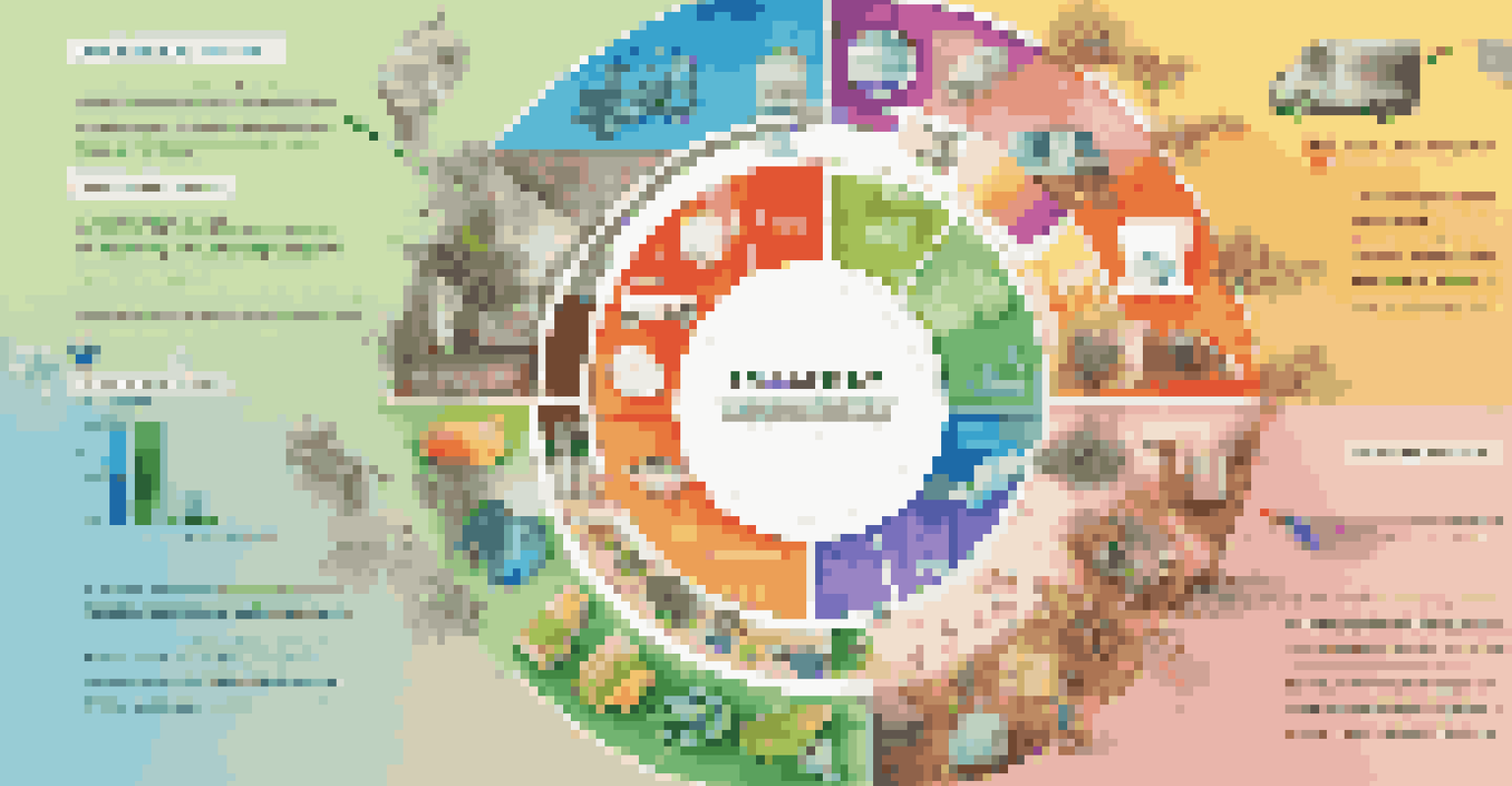Sustainability Practices to Support Business Resilience

Understanding Business Resilience in a Changing World
Business resilience refers to a company's ability to adapt and thrive amidst disruptions, whether they are economic downturns, natural disasters, or pandemics. In today's fast-paced environment, this adaptability is crucial for long-term success. Companies that embrace sustainability are often better equipped to face these challenges, as they tend to foster a culture of innovation and responsibility.
In the midst of chaos, there is also opportunity.
Incorporating sustainable practices not only helps businesses mitigate risks but also enhances their reputation among consumers who increasingly value corporate responsibility. For instance, a company that actively reduces its carbon footprint might attract environmentally-conscious customers. This shift in consumer behavior underscores the importance of aligning business strategies with sustainable practices.
Ultimately, understanding the synergy between sustainability and resilience is key to navigating uncertainty. By prioritizing eco-friendly approaches, companies can build a robust foundation that supports their operations and strengthens their market position.
Implementing Energy Efficiency for Cost Savings
One of the most effective sustainability practices is improving energy efficiency. By adopting energy-efficient technologies, businesses can significantly reduce their operational costs while also minimizing their environmental impact. For example, upgrading to LED lighting or installing smart thermostats can lead to substantial savings on energy bills over time.

Moreover, energy efficiency initiatives can enhance a company's resilience by decreasing dependence on external energy sources. When businesses consume less energy, they are less vulnerable to fluctuations in energy prices and supply disruptions. This not only stabilizes expenses but also contributes to a more sustainable future.
Business Resilience Through Sustainability
Companies that embrace sustainable practices are better equipped to adapt and thrive during disruptions.
Ultimately, prioritizing energy efficiency is a win-win scenario. It not only bolsters a company's bottom line but also helps the planet, making it a smart choice for businesses looking to thrive in an uncertain landscape.
Embracing Circular Economy Principles
The circular economy is a transformative approach that encourages businesses to rethink their production and consumption patterns. Instead of a linear model that follows a 'take-make-dispose' pathway, the circular economy focuses on reusing, recycling, and repairing materials. This not only conserves resources but also reduces waste, leading to a more sustainable business model.
Sustainability is no longer about doing less harm. It's about doing more good.
By adopting circular economy principles, companies can bolster their resilience against supply chain disruptions. For instance, businesses that utilize recycled materials are less reliant on virgin resources, which can be subject to market volatility. This strategic shift can lead to more stable operations and a reduced environmental footprint.
Incorporating circular practices can also enhance brand loyalty as consumers are increasingly drawn to companies that prioritize sustainability. By showcasing commitment to a circular economy, businesses can foster deeper connections with their audience, ultimately driving growth and resilience.
Investing in Sustainable Supply Chain Management
A sustainable supply chain is essential for enhancing business resilience. By sourcing materials from responsible suppliers and considering environmental impacts, businesses can reduce risks associated with unethical practices. For example, a company that partners with suppliers adhering to fair labor practices is less likely to face reputational damage or disruptions from social unrest.
Moreover, sustainable supply chain management can lead to improved efficiency. When businesses collaborate with suppliers that prioritize sustainability, they often discover innovative solutions that reduce waste and enhance productivity. This collaborative approach fosters a more resilient network capable of adapting to challenges quickly.
Energy Efficiency Boosts Resilience
Improving energy efficiency not only reduces operational costs but also enhances a company's resilience against market fluctuations.
Ultimately, investing in a sustainable supply chain is not just about ethics; it's a strategic decision that can drive long-term success. Companies that prioritize sustainability within their supply chains are better positioned to weather disruptions and maintain operational continuity.
Promoting Employee Engagement in Sustainability Efforts
Engaging employees in sustainability initiatives can significantly boost business resilience. When employees feel a sense of ownership and responsibility towards sustainability, they are more likely to contribute ideas and solutions that enhance the company's efforts. This collective engagement fosters a culture of innovation and adaptability, which is crucial in times of change.
Additionally, organizations that prioritize employee involvement in sustainability often experience higher morale and job satisfaction. When team members see their company taking meaningful steps toward environmental responsibility, they feel proud to be part of that mission. This sense of purpose can lead to greater productivity and retention, further strengthening the business.
By cultivating a workforce that is passionate about sustainability, companies can create a dynamic environment that thrives on creativity and resilience. This investment in employee engagement not only benefits the company but also contributes to broader societal goals.
Leveraging Technology for Sustainable Solutions
Technology plays a pivotal role in driving sustainable business practices. From data analytics to artificial intelligence, modern tools can help companies optimize their operations for efficiency and sustainability. For instance, smart software can analyze energy usage patterns, allowing businesses to identify areas for improvement and reduce waste.
Moreover, leveraging technology can enhance transparency within the supply chain. Blockchain, for example, can provide real-time insights into sourcing practices, enabling companies to ensure their suppliers adhere to sustainability standards. This transparency builds trust with consumers and stakeholders, further safeguarding the business against potential risks.
Employee Engagement Drives Innovation
Involving employees in sustainability initiatives fosters innovation and strengthens business resilience.
Ultimately, embracing technology is essential for businesses aiming to enhance their sustainability efforts. By harnessing innovative tools, companies can streamline their processes, minimize their environmental impact, and build resilience against future challenges.
Measuring and Reporting on Sustainability Progress
To effectively support business resilience, companies must measure and report on their sustainability initiatives. By establishing clear metrics, organizations can track their progress and identify areas for improvement. For instance, measuring carbon emissions or waste reduction efforts can provide valuable insights into the effectiveness of sustainability practices.
Transparency in reporting also builds credibility with stakeholders, including customers, employees, and investors. When businesses share their sustainability goals and achievements, they foster trust and demonstrate a commitment to responsible practices. This transparency can enhance brand loyalty and attract new customers who value ethical business operations.

In the end, measuring and reporting on sustainability is not just a checkbox exercise; it’s a vital component of a resilient business strategy. By actively monitoring their efforts, companies can adapt and evolve, ensuring they remain competitive in an ever-changing landscape.